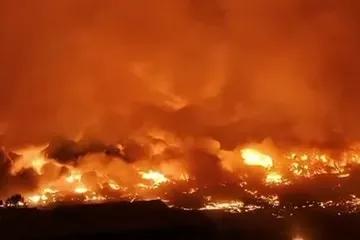The recent fire and series of explosions in Ezeiza, which resulted in more than 20 people injured, is not only a tragic event from a human perspective but also raises crucial questions about industrial safety and the economic implications for Argentina. This incident, which took place in a key industrial hub, highlights the need to assess how the lack of effective regulations can impact both businesses and citizens. What consequences will this event have for the local and national economy? This analysis seeks to unravel the factors behind the incident and its repercussions.
🔥 Current Outlook
The fire in Ezeiza, which occurred on Friday night, has generated significant attention due to its severity. According to initial reports, multiple explosions were recorded in an industrial area where chemical products were stored. Images of the damage show shattered windows and collapsed roofs, indicating a severe impact on local infrastructure. According to local media reports, firefighters managed to control the fire after hours of intense work. This incident not only represents an immediate challenge for emergency services but also raises questions about workplace safety and existing regulations in the industrial sector.
🌍 International Comparison
To better understand the context of the incident in Ezeiza, it is useful to compare this event with similar situations in other countries. For example, in 2020, an explosion occurred in a chemical factory in Beirut, Lebanon, leaving more than 200 dead and thousands injured. Subsequent investigations revealed serious failures in industrial safety regulations. In the United States, following several tragic incidents such as the one in Bhopal (India) in 1984, stricter regulations were implemented concerning the management of hazardous substances. These comparisons highlight how the lack of regulatory compliance can result in disasters affecting not only the businesses involved but also entire communities.
📉 Economic Implications
The economic consequences of the fire in Ezeiza are potentially severe. Firstly, the affected companies may face significant losses due to property damage and operational disruptions. Additionally, the cost of medical treatment for the injured could fall on the public health system if adequate accountability is not established. According to a World Bank study on industrial disasters, each similar event can cost the local economy between 1% and 3% of regional GDP depending on its magnitude and institutional response.
Furthermore, this type of incident could generate a negative effect on foreign direct investment (FDI). The global perception of industrial safety in Argentina could deteriorate if corrective measures are not taken promptly. Compared to Brazil or Chile, where regulations are stricter and occupational safety is prioritized, Argentina could lose competitiveness if it does not act quickly.
⚖️ Analysis of Causes and Factors
The root causes of the fire may be related to a combination of structural and cultural factors within the Argentine industrial landscape. Historically, there has been a lack of investment in infrastructure adequate for handling hazardous chemicals. According to data from the Argentine Ministry of Labor, less than 30% of companies comply with basic occupational safety regulations.
Additionally, the economic context also plays a crucial role; during difficult economic periods like the current one, many companies may opt to cut safety-related expenses to maintain operational margins. This creates an environment prone to industrial accidents like the one that recently occurred.
🚀 Strategic Perspective and Future Outlook
Looking ahead, it is essential for Argentina to take decisive action to prevent similar events from occurring again. The urgent implementation of stricter regulations on industrial safety should be accompanied by periodic audits to ensure compliance. Moreover, it is vital to foster a business culture that prioritizes not only profitability but also social responsibility.
The current situation offers a unique opportunity to review policies and invest in technologies that can mitigate future risks. International experience shows that preventive investments can be much more cost-effective in the long run compared to the costs derived from industrial disasters.
In conclusion, the fire in Ezeiza should not be viewed solely as an isolated incident; it is a call to reassess our regulatory structures and invest in a safer future for both workers and companies. Without significant changes now, Argentina could face even more severe economic and social consequences.

Comments